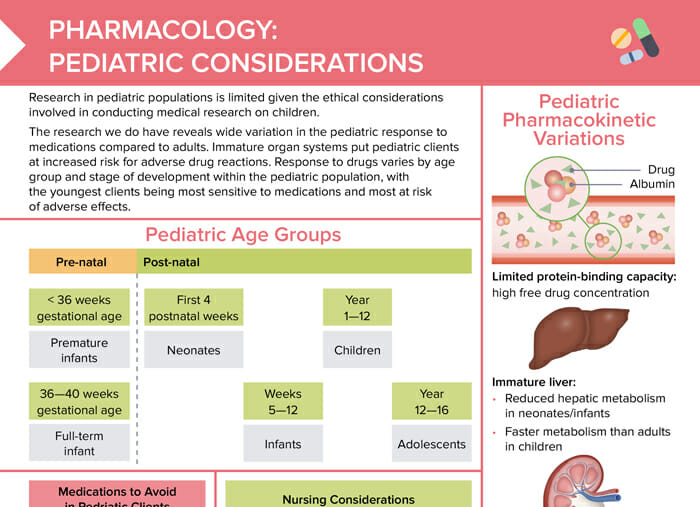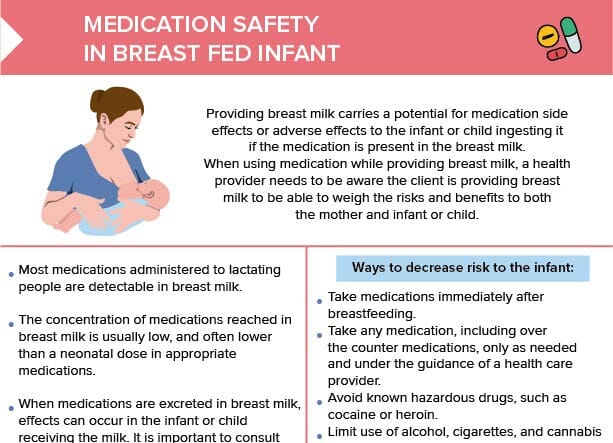Why is medication safety especially important during breastfeeding?
Providing breast milk carries a potential for adverse effects from medications to the infant or child ingesting it if the medication is present in the breast milk.
When using medication while providing breast milk, a health provider needs to be aware the client is providing breast milk to be able to weigh the risks and benefits to both the mother and infant.
- Most medications administered to lactating people are detectable in breast milk.
- The concentration of medications reached in breast milk is usually low and often lower than a neonatal dose in appropriate medications.
- When medications are excreted in breast milk, effects can occur in the infant or child receiving the milk. It is important to consult with a health care provider regarding the most recent evidence on medication safety during lactation.
Note: Pharmacology and medicine is ever-evolving. It is essential to keep risk vs benefit in mind when considering medication use while breastfeeding, as there is a shortage of reliable data regarding toxicity from drug use during pregnancy or breastfeeding.
How to decrease the risk to the infant
- Take medications immediately after breastfeeding.
- Take any medication, including over-the-counter medications, only as needed and under the guidance of a healthcare provider.
- Avoid known hazardous drugs, such as cocaine or heroin.
- Limit use of alcohol, cigarettes, and cannabis products.
- Avoid medications with long half-lives or medications labeled as extended release.
What is the breastfeeding medication list LactMed@NIH?
LactMed@NIH is a free and searchable database of drugs and other chemicals to which nursing mothers may be exposed.
What pain medication is safe while breastfeeding?
Commonly used pain medications considered to be generally safe during breastfeeding include acetaminophen (Tylenol) and ibuprofen (Advil, Motrin).
Anxiety medication while breastfeeding
Some selective serotonin reuptake inhibitors (SSRIs) like sertraline (Zoloft) and paroxetine (Paxil) are often considered as first-line options for treating anxiety in breastfeeding mothers due to lower levels in breast milk and fewer reported side effects in infants.
Cold medication while breastfeeding
Cold medications containing pseudoephedrine or phenylephrine are generally not recommended for breastfeeding mothers due to potential risks of reducing milk supply. Medications containing only acetaminophen are often considered safer, as are certain antihistamines like loratadine (Claritin).
Best ADHD medication for breastfeeding
Methylphenidate (Ritalin) and atomoxetine (Strattera), have been studied for use during breastfeeding with limited negative effects reported on the infant.
Allergy medication while breastfeeding
Antihistamines like loratadine (Claritin) and cetirizine (Zyrtec) are commonly considered safer options for breastfeeding mothers as they are less sedating and have low milk-to-plasma ratios.
Weight loss drugs while breastfeeding
It is recommended to avoid weight loss drugs during breastfeeding. Many weight loss medications can pass into breast milk and pose potential risks to the infant. Additionally, weight loss drugs could interfere with the mother’s ability to produce sufficient milk. For safe and effective weight management during breastfeeding, mothers should consult a healthcare provider for a personalized plan that may include diet and exercise.

